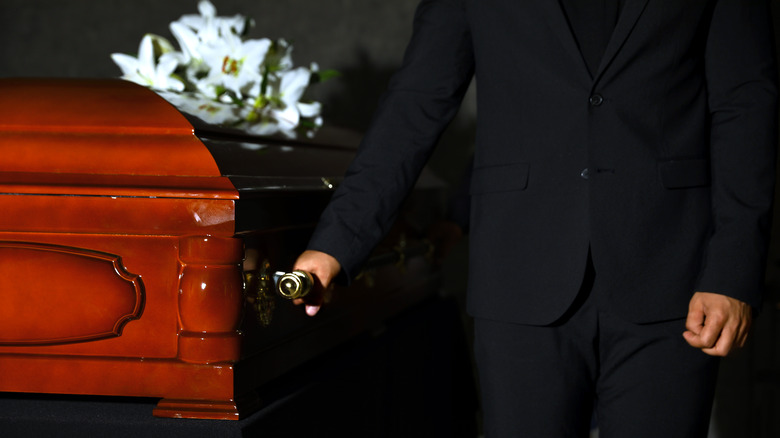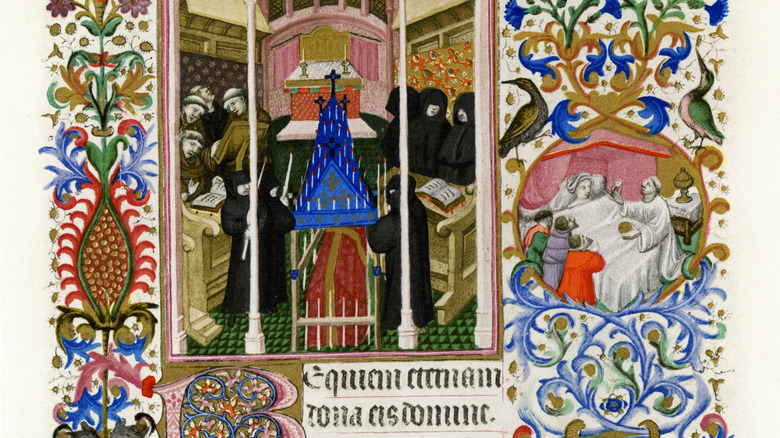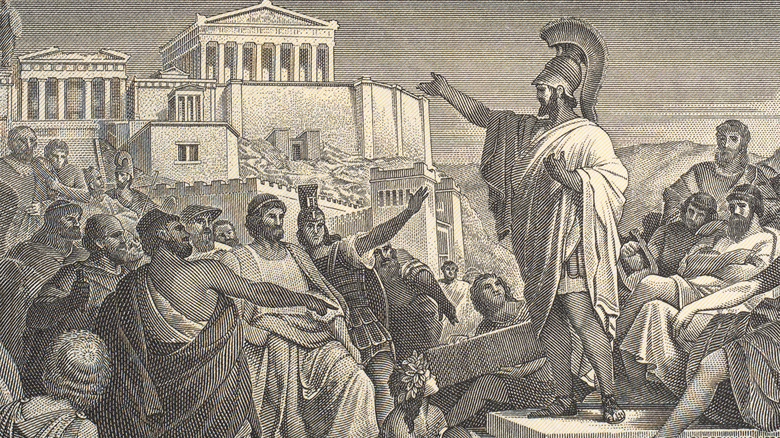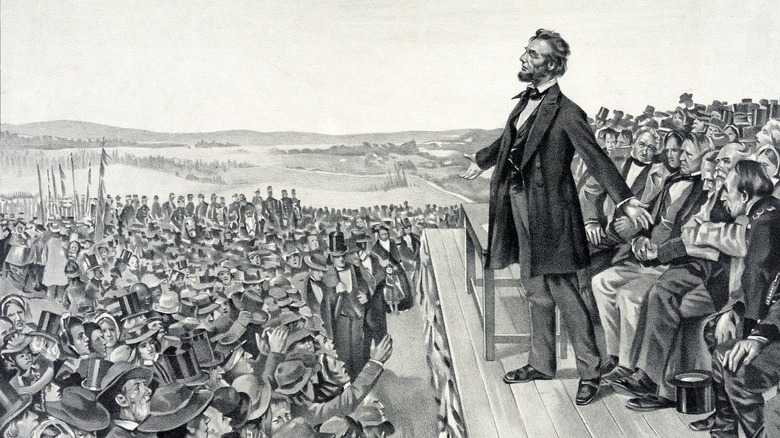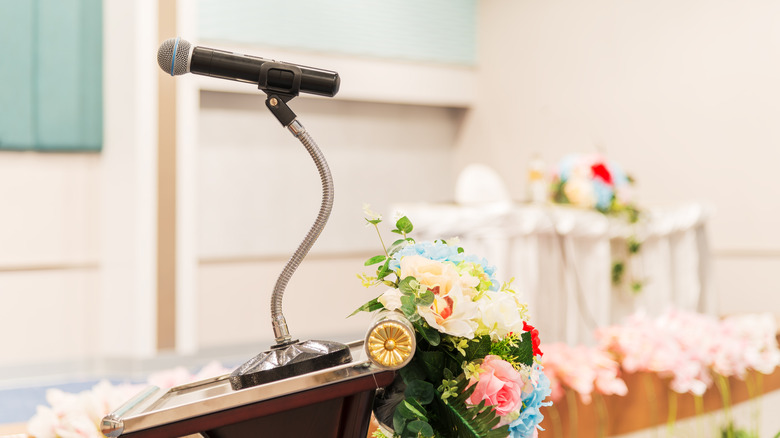The True Origin Of Funeral Eulogies
"Stop all the clocks," writes W.H. Auden in his 1938 poem "Funeral Blues." "Prevent the dog from barking with a juicy bone. / Silence the pianos and with muffled drum / Bring out the coffin, let the mourners come" (via AllPoetry.com). This poem is often celebrated as a staccato expression of the grief and despair felt at the loss of a loved one. Lines composed in such a way in the poetic world are called elegies, but speeches that praise and memorialize the dead (or sometimes living) are deemed eulogies (via Merriam-Webster).
Famous eulogies include those of Diana Spencer, Princess of Wales' eulogy presented by her brother Charles Spencer, and Rosa Parks, whose eulogy was given by Oprah Winfrey (via Funeral Wise). Some have a very serious tone, while others, such as that of Eric Idle for George Harrison, have a satirical and lighthearted tone meant to comfort the mourners.
Jewish funerals incorporate eulogies, called a hesped, in order to fondly remember the person who has passed away (via Goldsteins Funeral Home). The Catholic Church, however, does not allow eulogies as a part of the funeral itself, expecting the earlier vigil service to express the grief of mourners (via Boston Catholic Journal).
The etymology
According to The Online Etymology Dictionary, the origins of the word "eulogy" are from the mid-15th century. It is derived from the Latin "eulogium" which comes from the Greek "eu" which means "good or well" and "logia" which means "speaking." Loosely translated, it means to spell well of someone or something — technically, a place or a thing can be eulogized, such as the cat memorialized in 18th century poet Thomas Gray's "Ode on the Death of a Favourite Cat Drowned in a Tub of Goldfishes" (via Poetry Foundation).
The "logy" part of the word is quite important as it places the emphasis on the logic and rhetoric of the orator's intent (via Britannica). The rhetoric of a eulogy is meant to invoke a positive and lasting memory of the person who has died and the oration must be done in such a way to (hopefully) move the audience.
Ancient mourning
The act of eulogizing far predates medieval times. In ancient Greece, for example, elaborate funeral orations were given for soldiers lost in battles. In the fifth century B.C., Pericles popularized the eulogy form but did so in a more stoic and firm way than we might recognize today (via University of Minnesota Human Rights Library). Pericles, speaking of those lost in the Peloponnesian War, ended his lament (via University of Minnesota), "I have paid the required tribute, in obedience to the law, making use of such fitting words as I had. The tribute of deeds has been paid in part ... For where the rewards of virtue are greatest, there the noblest citizens are enlisted in the service of the state. And now, when you have duly lamented, every one his own dead, you may depart."
Pericles, like other Greek orators, spent much of the eulogy speaking of battle and the greatness of his city, Athens. Vikings had a similar approach in memorializing their dead. Viking funerals were theatrical enough, with burnings, but warriors and highly respected members of their communities were praised through words and an occasional ritualistic drink (via Cake Blog). The famous poem "Beowulf" gives us an idea of how the early Scandinavian mourners lamented (also via Cake Blog):
"And so Beowulf's followers / Rode, mourning their beloved leader / Crying that no better king had ever / Lived, no prince so mild, no man / So open to his people, so deserving of praise."
Eulogies in America
George Washington died on December 14, 1799, with over 400 eulogies delivered in his honor through February 22, 1800 (via Mount Vernon). People from all walks of life, including from marginalized voices, spoke affectionately of him. The Reverend Richard Allen, a former slave and one of the founders of the African Methodist Episcopal Church, spoke of Washington's intentions to free his slaves after his death. Allen stated (via Mount Vernon), "[T]o us he has been the sympathizing friend and tender father. He has watched over us, and viewed our degraded and afflicted state with compassion and pity — his heart was not insensible to our sufferings."
On November 19, 1863, Abraham Lincoln gave a eulogy that is one of the most memorable forms of American rhetoric in history. In the Gettysburg Address, he succinctly memorialized the many soldiers who died in the Civil War, saying (via National Park Service) the deceased should not have perished "in vain," and that the speech was "for us the living, rather, to be dedicated here to the unfinished work which they who fought here have thus far so nobly advanced."
When Lincoln was assassinated, many Americans would express publicly their grief (via The Library of America). One famous eulogy was composed and delivered by Frederick Douglass, an abolitionist and orator. Douglass had met Lincoln twice in his life and delivered his eulogy at Cooper Union. Unlike white mourners, Black mourners were not easily afforded the opportunity to eulogize the president, so many of them felt aligned with their values. Douglass asked that whites who lamented the president's death to follow his example.
Modern mourning
In the 1995 movie "Empire Records," Robin Tunney's character is very depressed and so her coworkers deliver a mock funeral for her where they say nice things about why her life is of value (via RogertEbert.com). A living eulogy was held for Albert Brooks on the premiere episode of Season 11 of "Curb Your Enthusiasm" (via TVLine). In typical Larry David fashion, hilarity ensued.
In a case of life imitating art, it is now becoming more commonplace for people to hold memorials — sometimes called "living funerals" — for those who are terminally ill or retiring so that they can hear the ways in which they would have been eulogized (via Better Place Forests). These ceremonies can be more humorous and joyful and give people the chance to say goodbye to one another. It is not only a one-sided affair and provides a different sense of closure. Sometimes legality gets involved, as well, when the person who is facing death reads their will so that there is no confusion as to who gets what in the end. Some people even create a musical playlist of songs that they would prefer people to reflect upon when they pass.
Delivering the final words and expressing grief
According to Esquire Magazine, giving a eulogy can be a cathartic experience, even though it may be difficult to compose. However, one should not undertake the task if they find it boring or if they cannot be bothered to write it down.
There are other ways of expressing grief that may or may not be considered eulogies. While some poets have delivered very memorable lines, sonnets, and stanzas, many songwriters have done the same. James Taylor wrote the first verse of "Fire and Rain" about a friend who had killed herself (via NPR). Robert Plant of Led Zeppelin wrote "All of My Love" as he mourned the death of his young son, Karac (via Far Out Magazine). Elton John changed the lyrics of "Candle in the Wind," originally written about Marilyn Monroe, to honor his friend, Princess Diana, at her funeral (via BBC).
Many people have a fear of public speaking, and so find the task of eulogizing someone to be arduous and daunting. However, gig economy sites that showcase the work of freelancers even have writers willing to do the work for you. Some companies now specifically specialize in crafting memorable eulogies (via GivetheEulogy.com). So if you are at a loss for words from the loss of a loved one, fear not.
